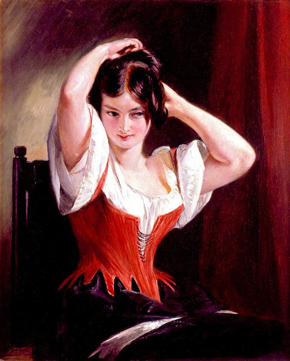Circus eroticus
by Lúcia Bettencourt
Dulcinea del Toboso by Charles Robert Leslie, 1839. V&A Collection
It was afternoon. The hustle and bustle downtown masked the nervous coming and going of men in front of the old two-story house on Rua Primeiro de Março. On the façade of dusty drawn blinds, a plaque read ‘SECOND-HAND BOOKS – 2nd floor’. Beneath, in small letters, the line ‘Ring the bell’. The client obeyed but was unsure anyone had heard. The noise of buses along the street drowned out all other sounds. Finally the door opened onto a dark, old, dilapidated stairway. If not for the young girl who’d come to open the door, the sense of going back in time would be complete.
When the door closed behind him, the client was enveloped by silence, heavy with dust and accumulated smells. At the top of the stairs faint chords of music drifted through the cracks of a finely wrought door. The servant girl lingered, waiting for the visitor to admire the intricate carvings. The intertwined feminine silhouettes, lifted veils, pert breasts, curved backsides ending in provocative buttocks took him by surprise. A giggle from the girl brought the man out of his trance and the door opened, soundlessly, into a parlour of velvets and carpets, tiles and stained glass. Air conditioning made the oriental luxury all the more inviting, and the newcomer settled comfortably on the ample sofa strewn with soft, plump pillows and listened to the unobtrusive background music.
The lady of the house came in unannounced, wearing a friendly smile. The servant girl followed her, bringing in a tray of coffee and pastries. Clients were always received the same way, with a show of respect as well as intimacy. The ensuing conversation proved interesting. The madame was cultured but knew to let her clients have the upper hand in conversation. Even the most ignorant felt smart and sophisticated talking with her. In no time, she would discover her visitors’ preferences and begin to awaken their appetites with descriptions of what was available in their area of interest.
The offerings were always literary or artistic – from de Sade to Ingres, from Louis L’Amour to Botticelli. All she avoided were modernist paintings and vulgar romance novels. A request for a Demoiselles d’Avignon would undoubtedly be accommodated, but the madame’s warm smile would fade as her lips turned downward and her kind eyes took on an icy glint of disapproval.
It was the client’s first visit to this garden of earthly delights and he wasn’t quite sure how to behave. His friends had recommended he start with something traditional, in the oriental vein, like the Kama Sutra. But they’d also told him he shouldn’t hesitate to ask for something from Machado de Assis, if he so desired; Virgilias, Sofias, and Capitus were always exciting – although they could be outrageously expensive since characters used to luxury and to ruining fortunes were always extravagant in their wishes. An ‘Admiral’s Night’ would fulfil his fantasies without emptying his pockets but it could prove mundane. The story’s suburban setting might compromise his pleasure. Maybe the best option would be the sexually charged atmosphere of a ‘Midnight Mass’, in which it would be up to him to steer the situation in a more concretely satisfying way.
He shyly thought about an Anna Karenina. He didn’t dare to suggest an Emma Bovary. The name reminded him of Jane Austen’s charming heroine. But how would he get her to keep quiet?”
He took his time, listening to the proprietress with interest, rapt by her skilful descriptions. The two spoke fluently and easily like old friends, which startled him – introvert of few words that he was.
He couldn’t decide. The East didn’t appeal to him: the veiled women were overcharged with mystery, where he was more direct, more objective. And he wasn’t sure he’d be able to read in their exotic features the reactions he hoped to elicit. Classic nudity wasn’t very sensual, though. He viewed it as an anatomy lesson. Having a Glaucia or an Aspasia in his arms could be as frustrating as Pygmalion’s embrace.
Medieval scenes were ceremonial and quite far removed, affording little intimacy. As much as he admired Francesca and her passion, he wouldn’t risk ending up in Hell for her. Yes, he was probably going to end up in the 19th century, with its Victorian alcoves, where violating the countless prohibitions made carnal acts all the more enticing. Moreover, he appreciated the seductiveness of intricate undergarments: the pleasure of undressing a woman was prolonged by each corset tie, each tiny silk button, each unexpected layer. Except that Machado was an arm and décolleté man, and the guest needed more than that: perfumes, audible moans, the glimpse of well-turned leg. An Eça might do the trick, but the client felt there was greater pleasure to be had at the author’s overflowing tables than in the scented bedchambers he described.
Alencar? No way. His women were overidealised. And when they revealed something, it was always deformed. And it was impossible to satisfy oneself amid the frenzied bacchanals of a Lucíola aspiring to sainthood, or in the angelic arms of the virgins who would sacrifice their bodies without enjoying any pleasure. He shyly thought about an Anna Karenina, sophisticated in her anguish yet capable of sacrificing everything for a good romp with Vronski. The madame reminded him of the fatal consequences: she could see how sensitive he was, and he might spend ages brooding over the beautiful and tortured Russian woman’s cruel suicide. Taking this into consideration, the client didn’t even dare to suggest an Emma Bovary. The name reminded him of yet another prospect, one of Jane Austen’s charming heroines. But how would he get her to keep quiet? Those women talked and talked, and with their mouths engaged in non-stop conversation, relations would be distracting and unfulfilling. He was already forgetting about Europeans when his hostess offered a Renoir. An interlude with a bather was tempting, but he thought better of it: those women were quite heavy and would be tiring. Maybe a Manet would satisfy him, then, a Déjeuner sur l’herbe, for example. The man’s grin conveyed his delight, but he was still undecided. The presence of other couples would inhibit him. Sighing, he left unspoken the possibility of a Fille aux yeux d’or, with her bold preferences. How to compete with the allure of another woman, with her brazen lack of inhibition? He would be a third wheel, easily cast aside, abandoned while the two women sated themselves on love between equals.
The proprietress renewed her offerings, tempting him with more exotic products. Goya’s women with their headscarves and lively eyes, smelling of sunshine and incense. He was almost convinced but remembered the expensive fabrics, the sophistication of the Court. The difficult Spanish hierarchy. His instincts spoke louder, and he confessed he would enjoy a Dulcinea, with her tavern smell, experienced hands, and a body used to amorous struggles. To him would fall the uncommon task of transforming her into a princess, making her garlic breath as sweet-smelling as roses, turning the straw in her hair into precious gems, weaving a royal cloak out of her tattered clothing.
With a puffed-out chest and a determined step, he followed the fairy godmother who promised to make his dreams come true. His raised sword was ready for the battle ahead, and it was with the spirit of a knight errant that he entered the room fixed up for his sally.
Translated from the Portuguese by Kim M. Hastings.
 Lúcia Bettencourt’s award-winning short story collections A secretária de Borges (Borges’s Secretary) and Linha de sombra (Shadow Line) and her novel O amor acontece (Love Happens) are published by Editora Record, Rio de Janeiro. She is a regular contributor to the Brazilian literary press.
Lúcia Bettencourt’s award-winning short story collections A secretária de Borges (Borges’s Secretary) and Linha de sombra (Shadow Line) and her novel O amor acontece (Love Happens) are published by Editora Record, Rio de Janeiro. She is a regular contributor to the Brazilian literary press.
 Kim M. Hastings studied Brazilian language and literature at Brown University and has a PhD in Spanish and Portuguese from Yale. She has translated fiction by Rubem Fonseca, Rachel Jardim, Marcelo Moutinho, Alberto Mussa, Edgard Telles Ribeiro, Nilton Resende and Ronaldo Wrobel. Her translation of Ribeiro’s O punho e a renda is published as His Own Man by Faber & Faber, Scribe and Other Press.
Kim M. Hastings studied Brazilian language and literature at Brown University and has a PhD in Spanish and Portuguese from Yale. She has translated fiction by Rubem Fonseca, Rachel Jardim, Marcelo Moutinho, Alberto Mussa, Edgard Telles Ribeiro, Nilton Resende and Ronaldo Wrobel. Her translation of Ribeiro’s O punho e a renda is published as His Own Man by Faber & Faber, Scribe and Other Press.

